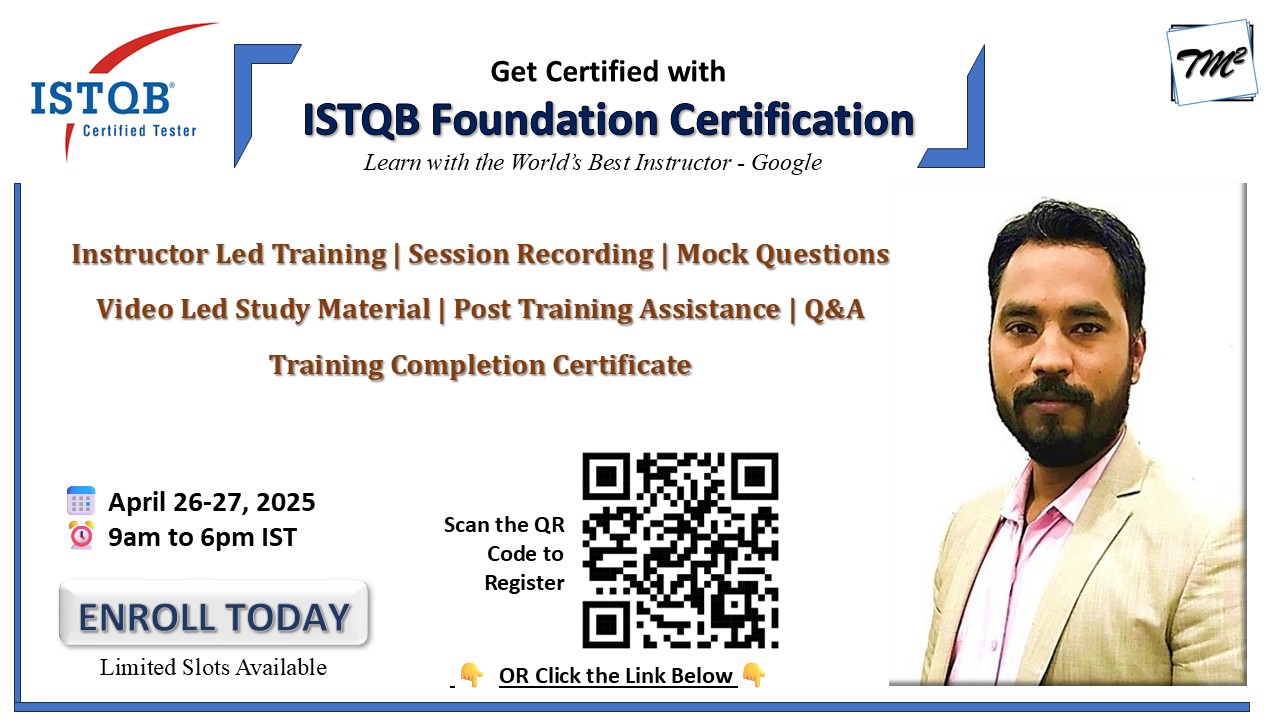
Enhance Your QA Career as Certified ISTQB Professional with TM SQUARE! ????
ISTQB Foundation Level Training helps software testing or QA professionals build their fundamentals strong and be job ready for the industry. The ISTQB® certification is globally recognised by all the organizations.
CTFL certification is recognized as a prerequisite to all other ISTQB® certifications where Foundation Level is required
-> What is Testing?
• Test Objectives
• Testing and Debugging
-> Why is Testing Necessary?
• Testing’s Contributions to Success
• Testing and Quality Assurance (QA)
• Errors, Defects, Failures, and Root Causes
• Testing Principles
-> Test Activities, Testware and Test Roles
• Test Activities and Tasks
• Test Process in Context
• Testware
• Traceability between the Test Basis and Testware
• Roles in Testing
-> Essential Skills and Good Practices in Testing
• Generic Skills Required for Testing
• Whole Team Approach
• Independence of Testing
-> Testing in the Context of a Software Development Lifecycle
• Impact of the Software Development Lifecycle on Testing
• Software Development Lifecycle and Good Testing Practices
• Testing as a Driver for Software Development
• DevOps and Testing
• Shift-Left Approach
• Retrospectives and Process Improvement
-> Test Levels and Test Types
• Test Levels
• Test Types
• Confirmation Testing and Regression Testing
-> Maintenance Testing
-> Static Testing Basics
• Work Products Examinable by Static Testing
• Value of Static Testing
• Differences between Static Testing and Dynamic Testing
-> Feedback and Review Process
• Benefits of Early and Frequent Stakeholder Feedback
• Review Process Activities
• Roles and Responsibilities in Reviews
• Review Types
• Success Factors for Reviews
-> Test Techniques Overview
-> Black-Box Test Techniques
• Equivalence Partitioning
• Boundary Value Analysis
• Decision Table Testing
• State Transition Testing
-> White-Box Test Techniques
• Statement Testing and Statement Coverage
• Branch Testing and Branch Coverage
• The Value of White-box Testing
-> Experience-based Test Techniques
• Error Guessing
• Exploratory Testing
• Checklist-Based Testing
-> Collaboration-based Test Approaches
• Collaborative User Story Writing
• Acceptance Criteria
• Acceptance Test-driven Development (ATDD)
-> Test Planning
• Purpose and Content of a Test Plan
• Tester's Contribution to Iteration and Release Planning
• Entry Criteria and Exit Criteria
• Estimation Techniques
• Test Case Prioritization
• Test Pyramid
• Testing Quadrants
-> Risk Management
• Risk Definition and Risk Attributes
• Project Risks and Product Risks
• Product Risk Analysis
• Product Risk Control
-> Test Monitoring, Test Control and Test Completion
• Metrics used in Testing
• Purpose, Content and Audience for Test Reports
• Communicating the Status of Testing
-> Configuration Management
-> Defect Management
-> Tool Support for Testing
-> Benefits and Risks of Test Automation
Perfect for: QA Enthusiasts & QA Professionals
# Batch: 26th – 27th April
# Timings: 9 am – 6 pm (IST)
# Includes Course Completion Certificate
Limited-time offer available now!
Register here - https://forms.gle/xgahP592HDy6MR7Y6 or Click on Register Button on Top